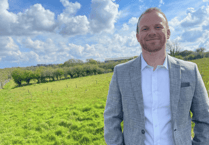It is often said there are two sides to every story. In my experience that is mostly the case. However, it can be very difficult to step back from long-held views and opinions and to see the other side of an argument.
Very few of us really ever want to admit we are wrong or that our opponent in a debate may have a good point. Passion, emotion and belligerence can often get in the way.
As a journalist and broadcaster I spent my entire career trying very hard to see both sides of some of the most controversial issues I was covering.
It’s surprising how easy it is to see a subject from totally opposite sides if you are able and willing to step back from it and listen to all the arguments.
It was my job to challenge the point of view of the person in front of me, whoever they were, and to find counter-arguments to dispute their position or to try to help viewers understand that there are alternative opinions.
Sadly, that role was sometimes misunderstood. On some of the most controversial topics my challenging stance was often mistaken for promoting one side or the other.
There were a few topics where the levels of anger and intimidation were frightening.
The debate over the ban on fox hunting was particularly nasty at times.
We had a duty to put concerns about animal cruelty to those who promoted the need for fox hunting. And, we had a duty to put the arguments for pest control to those who opposed hunting.
That wasn’t about our own opinions on the topic. But you’d be surprised how many threatening emails and letters we’d receive from both sides.
I can remember my co-presenter receiving an email accusing her of being pro-hunting because she wore a red jacket one night!
It was the same with badger culling and Brexit; subjects that very clearly and strongly divide opinion. Views became so entrenched that opponents would flatly refuse to see that the other side had some valid points.
But as a journalist I tried to stay in the middle and see things from both sides.
Admittedly it can be hard to stay neutral and like everyone else I will have personal views on certain topics. But, my experience as an interviewer has given me an ability to weigh up arguments and to see that there is often merit on both sides.
That is where I find myself in the current row over Inheritance Tax on farmers.
It is interesting how many of the most bitter rows and conflicts I have covered involve farming: fox hunting, badgers, Brexit and now Inheritance Tax.
I was watching the Budget on the day the changes for farmers were announced. I remember having a sharp intake of breath; immediately I knew it would be hugely controversial.
My first response was: ‘why target farmers?’ Then the Chancellor outlined that farmers would still be getting a very favourable Inheritance Tax rate compared to the rest of us.
So, suddenly there are two sides to the debate.
Soon after the Budget I spoke to a farmer friend of mine. Understandably he doesn’t like the Inheritance Tax changes, but doesn’t dismiss them entirely.
He believes the proposed threshold is too low and too many small, family farms will be caught. But, he also believes there’s scope to tax the huge multi-million pound industrial farms.
He was also surprised that more farmers haven’t put succession plans in place. His farm had already passed to his generation even though the previous one is still very much alive.
I have since listened carefully to comments made at the various protests and have listened carefully to the response from Ministers.
As far as I can tell there are pros and cons on both sides, as is so often the case.
On the one hand farming is a special case when it comes to inheritance. I can’t think of many other occupations where you are more likely to be born into the job rather than choosing it.
So, if a farm isn’t passed down largely tax free from one generation to the next, where are the future farmers going to come from?
On the other hand, why should farming estates, which can be very valuable on paper, escape paying Inheritance Tax? As it is the current proposals still give generous concessions to farmers.
There are so many other arguments for and against.
In the current debate I have heard Ministers claim that many farms won’t fall into the new tax brackets.
If that’s the case the question to Ministers is: ‘Why are you even bothering to cause such upset and uncertainty in the farming industry?’ Is the agricultural aggro really worth it?
On the other hand the question to famers is: ‘Why shouldn’t your estate pay a bit towards the running of public services, why should you have special treatment when the country is in such an economic mess?’
Also, with clever planning and expert advice many farms can possibly avoid the worst of the impact.
But of course there is a bigger question affecting everyone. Why are any of us taxed for dying?
We are taxed on pretty much everything we do and buy when we’re alive and yet the State also wants an extra pound of flesh when we are dead.
Having listened to both sides, I think there probably is a case for farming to be treated differently, otherwise I can’t see where the next generation of farmers will come from.
The government of course is claiming it is doing just that; it is still giving farmers special treatment.
Two sides to the story, but I wouldn’t like to predict the outcome of this one.
Bye for now!





Comments
This article has no comments yet. Be the first to leave a comment.